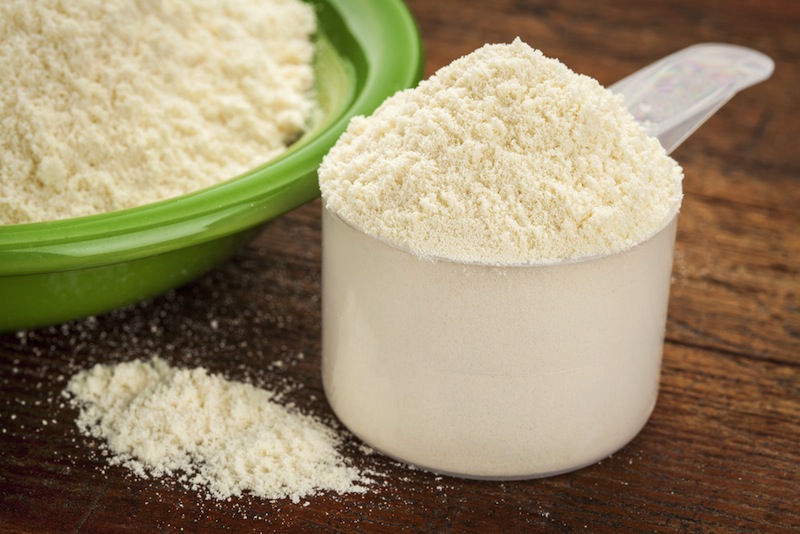What Is Whey Protein?

Whey protein is a popular diet supplement among people of all ages. Baby formulas include it, as do nutrition shakes for the elderly. Weight-loss supplements contain whey powder as an appetite suppressor, yet young men buy whey protein powder by the gallon in hopes of building muscle mass.
Much of whey protein's appeal is in its texture. Whey is the liquid left behind when milk is turned to cheese. The protein in whey is one of the two main proteins in milk, the other is a protein called casein. (When an acidic substance such as vinegar is mixed into milk, these two proteins will separate -- the casein proteins glob together to form solids called curds, leaving the whey as a liquid.)
Whey protein may show up in your favorite baked goods or ice cream as a way to replace the consistency of fat without the actual fat.
Like all proteins, whey protein is made of building blocks called amino acids. Protein in the body is primarily used for muscle growth and to repair tissues. When people digest food, they break down the proteins into amino acids, and then use those amino acids to build new proteins.
Body builders prize whey protein as a good source of the amino acids leucine, isoleucine and valine. Together these amino acids make up the BCAAs (3-branched chain amino acids) that are important in building muscle. There are nine essential amino acids that humans must get from food to survive and thrive. In addition to BCAAS, whey protein also contains all the essential amino acids.
Early studies have linked whey protein supplements with a stronger immune system and athletic endurance. But whey protein supplements are touted as a way to increase energy, fight stress and improve mental focus. Very early studies indicate whey protein may have a role in the body's cancer-fighting abilities. Whey protein is also said to help control blood sugar, lower cholesterol, treat asthma and possibly prevent allergies.
Do whey protein supplements work?
Whey protein supplements can certainly provide high-quality protein in the diet. But most health organizations, including the Centers for Disease Control and Prevention, recommend getting your protein from food and not supplements if given the choice. Meat, poultry, fish, legumes, tofu, eggs, nuts, seeds and milk are all good sources of the essential amino acids people need.
Early studies have shown taking whey protein supplements before or after exercise can improve muscle strength, lean-muscle growth and immunity. One study of 387 U.S. Marines put protein supplements to test during basic training. At the end of 54 days, the protein-supplemented group showed stronger immune systems, with 33 percent fewer medical visits than the Marines given a placebo, or a carbohydrate and fat supplement. Marines taking the protein supplements also experienced less muscle soreness and had 28 percent fewer medical visits for muscle and joint problems. The members of the group taking protein supplements were also less likely to visit doctors for infections during the study, published in 2003 in the Journal of Applied Physiology.
Among other protein supplements, small studies show whey protein may have an edge at increasing muscle mass. In one study, researchers at the Human Performance Laboratory at the University of Connecticut divided 63 men and women into groups receiving a soy supplement, a whey supplement or a carbohydrate supplement. Over the course of a nine-month training regimen, researchers found that those taking whey protein gained several more kilograms of muscle mass than people taking the other supplements, according to the 2013 article published in the Journal of the American College of Nutrition.
But the timing of taking whey protein supplements can change how effective they are. A 2009 joint statement by the American Dietetic Association (ADA), Dietitians of Canada (DC) and the American College of Sports Medicine (ACSM) noted that eating protein during exercise did little to improve athletic performance. The statement recommended eating a low-fat, high-carb snack that is moderate in protein content before exercise, to make fuel available to the muscles.
Protein digested after exercise provides the amino acids the body needs to repair and build new muscles. Eating whey protein right after exercise could be especially useful because whey protein has a high level of leucine, an easily absorbed amino acid, according to Joslin Diabetes Center.
Many of whey protein's purported health benefits are linked to a powerful antioxidant called glutathione. People with HIV, liver disease, diabetes and various cancers can all develop low glutathione levels in the body. The body can make its own glutathione from the amino acid cysteine, and whey happens to be high in cysteine. Studies confirm eating whey protein increases the levels of glutathione in the body. However, there is only preliminary evidence investigating whether whey protein has a meaningful effect on the health of people with conditions linked to low glutathione.
Small studies done in people show whey protein may have a modest effect on asthma symptoms, inflammation after stroke and some liver conditions by indirectly increasing glutathione levels. Animal studies show whey protein supplements fed to rats can prevent inflammation and early signs of complications from obesity and diabetes, according to a 2012 review published in the journal Lipids in Health and Disease. The review also found promising evidence that whey protein can trigger the release of hormones that make people feel full, and very preliminary evidence that whey protein may help lower high blood pressure.
Whey protein also shows a potential for lowering blood sugar. A study of 14 people with type 2 diabetes found that combining whey protein with a high-sugar meal increased people's insulin production and quelled the expected blood sugar spike following the meal. The study was published i 2005 in the American Journal of Clinical Nutrition.
Are whey protein supplements safe?
The safety of whey protein supplements depends largely on the dose. Most Americans eat twice the protein they need, according to the National Institutes of Health (NIH). Excess protein of any kind will be stored as fat in the body, and can increase the risk of dehydration.
Too much protein may also increase a person's risk for calcium loss and osteoporosis. That's because acids are released into the bloodstream when protein is digested, and the body uses calcium to neutralize these acids. It is possible that the extra calcium needed will be leeched from bones, according to the NIH. However, studies are inconclusive on this point. Some research shows high-protein diets are correlated with more fractures, but other research has found people with high-protein diets have increased bone density, according to the Harvard School of Public Health.
Athletes can safely eat more protein than people who are not physically active. In fact, an athlete who does not get enough protein will sustain some muscle damage and take longer to recover. The average person needs 0.8 grams of protein a day per every kilogram of body weight. This translates to about 50 to 65 grams of protein a day, or roughly 4 ounces of meat and 1 cup of cottage cheese. On the other hand, an athlete may need 1.2 grams or even up to 2.0 grams of protein per kilogram of body weight a day, according to various statements by the American Dietetic Association, the American College of Sports Medicine and the International Society of Sports Nutrition.
Because whey is a dairy product, people with milk allergies should avoid whey protein. People who are lactose intolerant should also take caution. Different whey protein powders can vary in calories, and fat and lactose content. Whey protein isolate is 90 percent protein and contains little to no fat, cholesterol or lactose. But whey protein concentrate can have 29 to 90 percent protein, and as the proportion of protein goes down, the fat and lactose content in a whey protein supplement increases. Protein supplements of any kind may cause additional strain on the kidneys if a person has a kidney condition.
Most supplements on the market haven't caused problems, but there is less oversight of supplements sold in the United States than of prescription drugs. In their joint statement, the American Dietetic Association and the American College of Sports Medicine noted some cases of protein supplements also containing anabolic steroids. One 2010 experiment by Consumer Reports tested 15 protein drinks purchased online or from stores in the New York metro area. The study found three products that would exceed the daily limit of arsenic, cadmium and mercury set by the U.S. Pharmacopeial Convention if a person consumed more than the three recommended servings.
Whey protein may also interact with some medications. Whey protein supplements can decrease the effectiveness of the Parkinson's drug levodopa. Whey protein supplements may also reduce how much of the osteoporosis drug alendronate is absorbed by the body, making the medicine less effective. Whey protein supplements may reduce the effectiveness of quinolone and tetracycline antibiotics. People with diabetes may experience changes in blood sugar when taking protein supplements.
It is best to talk to your doctor about your athletic goals and personal needs before starting protein supplements. Overall, the International Society of Sports Nutrition considered a short-term regimen of whey protein supplements safe for most healthy adults.
Follow Live Science @livescience, Facebook & Google+.
Sign up for the Live Science daily newsletter now
Get the world’s most fascinating discoveries delivered straight to your inbox.

Wilkes Land crater: The giant hole in East Antarctica's gravitational field likely caused by a meteorite
Get a closer look at wildlife for less: This huge $60 saving on the Bushnell 10x42mm Trophy XLT binoculars — now down to their lowest-ever price at Adorama
Acer Aspire Vero 16 review: Admirably eco-conscious










